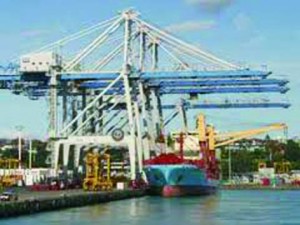The Ports of Auckland dispute
From the statement of the Auckland Catholic Diocesan Commission for Justice and Peace
Considering the Ports of Auckland dispute
in the light of Catholic social teaching
 New Zealand’s industrial framework no longer has processes to require compulsory arbitration or mediation of protracted disputes, which is why offer of mediation by the Anglican and Catholic Bishops of Auckland is important.
New Zealand’s industrial framework no longer has processes to require compulsory arbitration or mediation of protracted disputes, which is why offer of mediation by the Anglican and Catholic Bishops of Auckland is important.
Media reports have not done justice to either side of the dispute. It is important to look beyond the headlines to understand what the impact of the proposed changes will mean
The employer case is asking for greater flexibility and casualisation of the workforce, in part because the Auckland City Council is requiring a significant increase in productivity. Auckland Port is finding it difficult to compete with the casualised Tauranga Port workforce.
The union case is that the flexibility asked amounts to a complete casualisation of the workforce, with a loss of job security, guaranteed hours of work, and guaranteed family income. They also point to three deaths at Tauranga Port in the last 18 months as an example of the weakening of health and safety protection with a casualised workforce.
There are many committed Catholics both among unions and employers. However, not all Catholic workers or employers look for guidance from Catholic social teaching in considering issues of industrial relations, though they may be motivated to work for just solutions in a general sense. Catholic social teaching on work is complex, and it is important to spend time reflecting on it in totality, rather than to quote selectively from its texts to suit pre-determined positions.
A fundamental question that Catholic social teaching leads us to ask in considering any proposal about changing working conditions is “How does this change affect this person as a human being, as a member of a family, as a member of a community?” This does not put aside questions about the need for a company to trade profitably, or for the responsibility of employers to manage both for the short and long term future of the business. But it does put the focus much more on the workers as people, and not simply as commodities or tools of production.
 Entries(RSS)
Entries(RSS)